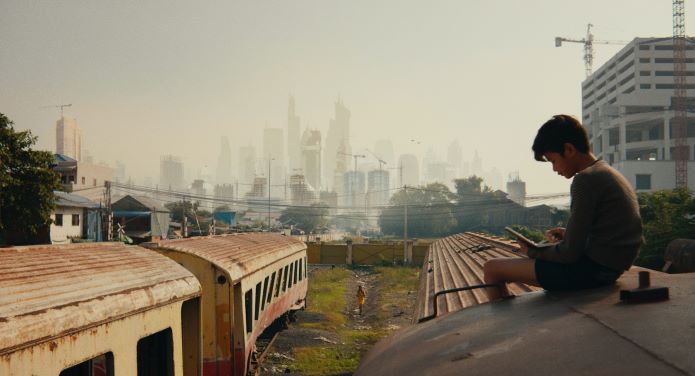This trippy science-fiction thriller from Cambodia centers on a young boy whose visions could point the way to a valuable treasure. When we first meet Leng Heng (Leng Heng Prak), whose family lives in a dense slum in Phnom Penh, he is sketching what he has seen in his dreams of his past lives. Although he hangs out with a group of boys, it’s Srey Leak (Srey Leak Chhith), an orphan girl, who really sets off Heng’s search for a solid gold statuette of Buddha, which has repeatedly appeared in his dreams—she has a knack for finding things
If he finds the object, Heng wants to sell it and, in theory, use the money to save his family’s home from a greedy corporation that plans to bulldoze the slum to build a bullet train to China. Fast-paced, shot with jittery camerawork, and full of eye-popping sights, the film’s first half is a lively adventure through a striking urban underworld. (At night, the nearby commercial streets are lit with colorful neon lights.)
Despite being standoffish at first, Leak gradually warms to Heng and his large, bustling family, including his kindly mother (Sveng Socheata), who has been organizing protests against their community’s displacement. Leak also reveals herself to be a master of the hustle: After negotiating a large cut of the treasure’s worth in exchange for her services, she takes Heng around to various fringe characters who help interpret his drawings.
The film takes place in a not-so-distant future in which anyone with a small, round device called a nanobug, which attaches to the middle of the forehead, can opt to become “augmented,” which means entering a state that’s somewhere between the Internet and virtual reality. Due to its growing popularity, those who are augmented are everywhere, staring vacantly with glowing blue eyes and gesturing with their fingers in midair. A major plot point involves Heng and Leak visiting her brother, a hacker, in order to get augmented themselves, as there are apps that would allow Heng to record his dreams.
This opens up a major avenue of storytelling as, for the first time, we see this world through the eyes of someone in this hybrid online/VR state. The result is an iridescent data code lining the walls or floating in the air, not so much different from the special effects that movies like The Matrix (1999) provided more than two decades ago. Fortunately, director Jake Wachtel doesn’t overdo it and finds narrative reasons for Heng to only use the nanobug in short bursts. In general, the effects shots are used conservatively. Appearances by futuristic-looking skylines or hovering drones are convincing enough to provide atmosphere, though none are as immersive as the actual streets teeming with foot traffic, merchants, and bicycle-drawn taxis.
Karmalink’s strongest assets are the visuals and chemistry between the two adventurous kids—Leak has a mercurial temperament, while Heng is serene almost throughout—so they play off each other well. The main plot that emerges, however, threatens to become a little too esoteric for its own good. It involves two neuroscientists, one of whom recruits Heng for an experiment involving past lives that had been spearheaded by her colleague, who now lies in a coma. The latter’s grand ambition was to map karma, though by the end, I still wasn’t sure how anyone would do that.
Also, by the time the movie reaches its climax, it has abandoned the lively city backdrop for cavernous spaces that, on the one hand, imply infinite space and time, but are far less compelling. There is also relatively little for the two main protagonists to do during these scenes, even with the stakes being fairly high. Yet on the whole, the film has enough to recommend it, and it should benefit from positive word of mouth and, hopefully, find future life as a cult fave.

















Leave A Comment